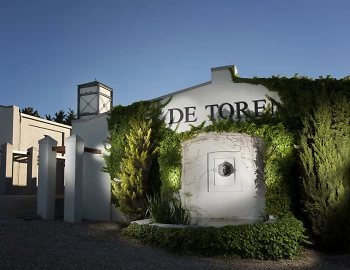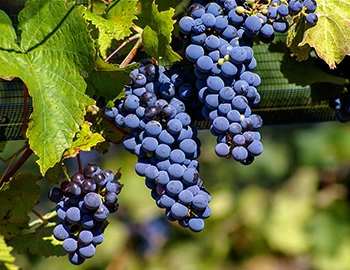
Délicate
Stellenbosch, De Toren, 750 ml

| Grape variety: | Malbec, Cabernet Sauvignon, Cabernet Franc |
| Producer: | De Toren |
| Origin: | South Africa / Coastal Region / Stellenbosch |
Description
This Malbec dominated assemblage exudes scents of black cherries and ripe wild berries, with a hint of cinnamon and cloves. Equally silky-smooth and fresh, the Délicate nestles to the palate. A delightfully elegant and youthful, non-vintage red quality, which evokes the impression of a white wine owing to its exacting production, but seduces like the red variety. With a Malbec portion above 50%, Délicate is produced without contact with the skin in the same manner as a white wine, while the matured red wine portions of the other three grape varieties from the previous vintage are blended. On the palate, aromas of plums, strawberries and roses develop. The perfect consumption temperature is a refreshing 11°C.
Attributes
| Origin: | South Africa / Coastal Region / Stellenbosch |
| Grape variety: | Malbec, Cabernet Sauvignon, Cabernet Franc |
| Ripening potential: | 1 to 5 years |
| Drinking temperature: | 10 to 12 °C |
| Food Pairing: | Spaghetti con sugo al basilico, Risotto ai frutti di mare, Crispy roast chicken, Moroccan specialities, Mild Asian dishes |
| Vinification: | saignée, pressed carefully and immediately |
| Harvest: | hand-picking |
| Maturation: | partly in steel tank, partly in barrique/ Pièces |
| Volume: | 14.0 % |
| Note: | Contains sulphites |
De Toren
De Toren is one of the first wineries in South Africa to producing classic Bordeaux-style wines. Since its foundation, the De Toren vision has been and remains the reinterpretation of the Bordeaux concept and to create unique South African wines from the five grape varieties Cabernet Sauvignon, Merlot, Cabernet Franc, Malbec and Petit Verdot. De Toren is one of the first wineries in South Africa to producing classic Bordeaux-style wines. Since its foundation, the De Toren vision has been and remains the reinterpretation of the Bordeaux concept and to create unique South African wines from the five grape varieties Cabernet Sauvignon, Merlot, Cabernet Franc, Malbec and Petit Verdot.
This acclaimed winery is located at the highest point of the Polkadraai Road in the Polkadraai Hills, boasting a view over False Bay and onward to the Atlantic Ocean.

Malbec
New Home, New Fortune
The Malbec once belonged to the classic assortment of varieties from Bordeaux. But it was demanding to cultivate, and in the changeable climate of the Bordelais it often became green and herbaceous, so winemakers replaced it with Merlot in the middle of the 20th century. Luckily, the Malbec found a new home in Argentina. In 1868, a Frenchman brought the first stocks along to the land of the Andes. Today, the Malbec is the most-planted variety there. Especially in Mendoza, it shows what it can do: it yields very dark, well-structured wines with aromas of black fruit, violets and game. They just call out for an Argentinean steak! The Malbec has its origins in Cahors, in southwestern France. There, it is kept today under the name Cot. Due to their earthy tannins, in the middle ages the growths from this area were also called "the black wines of Cahors".


